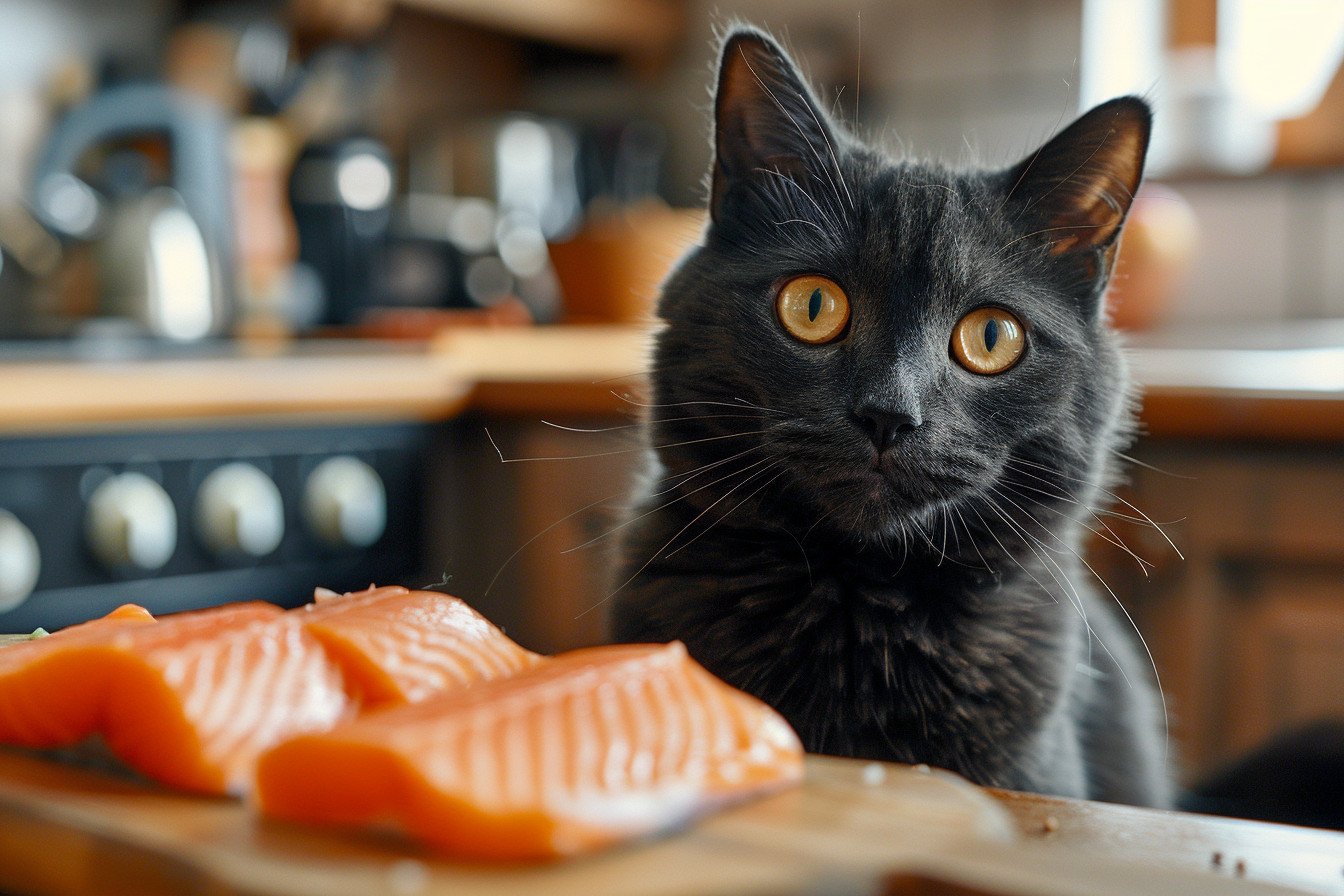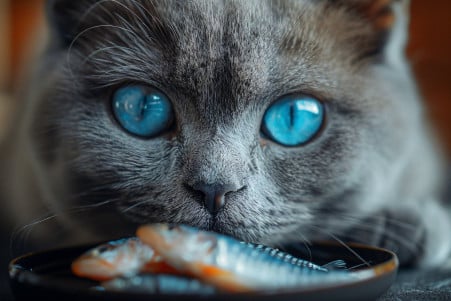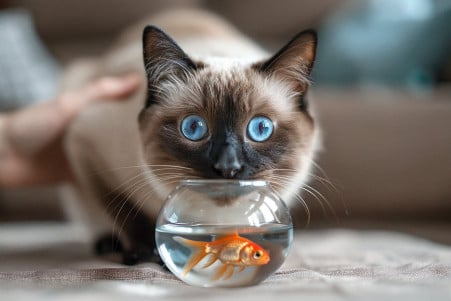Why Do Cats Like Fish? The Science Behind Their Desires
19 May 2024 • Updated 18 May 2024

If you’ve ever been around a cat, you’ve probably noticed that they can’t get enough of fish. Even the smell of fish can send them into a frenzy. But why are cats so obsessed with fish? It turns out that there are several reasons, including their biology, evolution, and even their behavior.
This article will take a deep dive into the history, science, and research that explains why cats like fish so much. By learning more about why this preference exists, you can better understand your cat’s nutritional and behavioral needs and make sure that you’re meeting them in a way that also lets them indulge their love of fish.
Why do cats like fish?
Why Do Cats Like Fish So Much? It's More Than Just Taste
Cats' love of fish is more than just a matter of taste. In fact, cats' preference for fish is so strong that it's been called an "obsession" by some researchers. But why do cats love fish so much?
The answer is that cats' preference for fish is due to a combination of factors, including their taste preferences, their sense of smell, and their genetics.
In terms of taste, cats have a very different palate than humans. Cats can't taste sweetness, as Scientific American explains. Instead, cats are highly sensitive to savory flavors, especially umami, the taste of amino acids found in meat and fish.
In fact, as Science magazine reports, cats have evolved to express genes that allow them to detect umami compounds, and they're especially sensitive to the umami compounds found in tuna. This, along with cats' ability to taste adenosine triphosphate (ATP), a compound that signals the presence of animal-based proteins, makes fish especially appealing to cats.
In addition to taste, cats' sense of smell plays a role in their preference for fish. As Hill's Pet explains, the smell of fish is especially strong and pungent, which makes it especially appealing to cats, who have a much stronger sense of smell than humans.
Finally, texture and temperature also play a role in cats' preference for fish. Cats prefer foods that are soft and moist, and these foods release more scent molecules when they're warmed, which makes them more appealing to cats.
So while cats' preference for fish is rooted in their evolution, their love of fish is also due to a combination of factors, including taste, smell, and texture. This multi-sensory experience is why cats love fish so much and why it's the perfect food to satisfy their carnivorous cravings.
Cat Nutrition: Fish and Its Nutritional Value
Fish is a great source of protein, which is important for a cat's obligate carnivore diet. As Hill's Pet points out, fish has the amino acids cats need in the right proportions. In addition, fish like salmon and mackerel are high in omega-3 fatty acids, which are important for skin, coat, and brain health, as Simply Naked Pet Food explains.
Fish also has taurine, an amino acid that's important for a cat's heart and eyes, as the Cornell University College of Veterinary Medicine notes. Fish can add some variety to a cat's diet and help ensure they get a good balance of nutrients.
That said, fish should be fed in moderation and not be the only source of a cat's nutrition. Hill's Pet explains that too much fish can lead to imbalances in other important nutrients. It's always a good idea to talk to your vet before making any major changes to your cat's diet to make sure they're getting everything they need.
Cat Food Allergies and Intolerances: When Fish Isn't Healthy
Although many cats love the taste and health benefits of fish, some cats can be allergic or intolerant to certain fish proteins. Cornell University's College of Veterinary Medicine explains that food allergies in cats are an immune system reaction that often results in skin and gastrointestinal problems, while food intolerances are digestive problems that don't involve the immune system and can cause vomiting and diarrhea.
PetMD points out that the most common allergens for cats are beef, chicken, dairy, eggs, and fish proteins. Both food allergies and intolerances can be managed by identifying and eliminating the problematic ingredient through an elimination diet trial. This allows cat owners to make sure their pets can enjoy the health benefits of fish as part of their diet without any problems.
Cat Fishing Instincts: Breed Differences
Although all domestic cats are descended from wild cats with hunting instincts, some breeds may be more predisposed to hunting fish and other aquatic prey due to their genetic background. For example, according to Adventure Cats, breeds like the Turkish Van, Maine Coon, and Norwegian Forest Cat all have historical connections to coastal areas, which may mean they are more likely to enjoy playing in water and hunting fish and other aquatic animals.
As International Cat Care points out, domestic cats are descended from the most successful hunters, so their hunting instinct is still strong. However, a cat's hunting behavior is also influenced by their individual likes and dislikes and what they have learned about hunting from their experiences, regardless of their breed. The Dezi & Roo blog notes that all cats have a love of hunting and stalking, but their hunting styles and preferences can vary.
Although some breeds may have a stronger predisposition to hunting aquatic prey, most domestic cats will have some level of hunting instinct, even if they are primarily fed by their owners. Knowing about these breed differences and individual likes and dislikes can help cat owners better meet their feline friend's natural needs, whether that means letting them hunt fish or other types of prey.
How to Add Fish to Your Cat's Diet
While fish can be a healthy part of your cat's diet, there are some things to keep in mind. PetHonesty explains that raw fish should be avoided because it can contain bacteria and thiaminase, an enzyme that breaks down vitamin B1.
On the other hand, cats can eat cooked fish that's been deboned, such as salmon, tuna, and sardines, in moderation as a treat or a meal topper. Catster notes that fish should be cooked to an internal temperature of at least 145°F to kill bacteria. It's also better to feed cats smaller fish like sardines, which are less likely to contain mercury than larger predatory fish.
If you're planning to make any major changes to your cat's diet, it's always a good idea to talk to your vet. They can offer personalized advice to help you make sure that your cat is getting the nutrition they need while minimizing the potential downsides of adding fish to their diet.
Conclusion: Understanding and Meeting Your Cat's Needs
The preference for fish in cats is a combination of their evolutionary history and their needs as obligate carnivores. Fish is a good source of the protein, omega fatty acids, and taurine that cats require. While some cats may be allergic or sensitive to fish, most cats can benefit from fish as part of a balanced diet.
Knowing about a cat's senses and the traits of different breeds can help you better understand and meet your cat's needs. Working with your veterinarian can help you make sure that you're meeting your cat's needs in a way that's safe and healthy.


